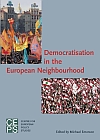The Dynamics and Sustainability of the Rose Revolution
The Dynamics and Sustainability of the Rose Revolution
Author(s): Ghia Nodia
Subject(s): Civil Society, Governance, Government/Political systems
Published by: CEPS Centre for European Policy Studies
Keywords: Democracy development in Georgia; Rose Revolution; Eduard Shevardnadze; Mikheil Saakashvili;
Summary/Abstract: This essay seeks to identify what the case of Georgia – more specifically, the Rose Revolution and its aftermath teaches us about the nature of revolutions and the prospects for democracy in countries that are, well, like Georgia. The phrase ‘countries like Georgia’ refers to countries and political regimes that are not democratic, but which cannot be considered classical dictatorships either. Such countries have both authoritarian and democratic elements in their political systems (and the democratic elements are not just a façade), so there are some internal political dynamics that make the prospects for the implementation of the democratic project not completely hopeless. This description relates to a very large part of the world that is often called the ‘grey zone’ – a reflection of mainstream political science’s inability to find some kind of acceptable term for it.
Therefore, this essay is structured according to the conceptual problems that exist around the democratisation project in our world – and about which the experience of the Rose Revolution in Georgia has something to say.
Book: Democratisation in the European Neighbourhood
- Page Range: 38-52
- Page Count: 15
- Publication Year: 2005
- Language: English
- Content File-PDF

